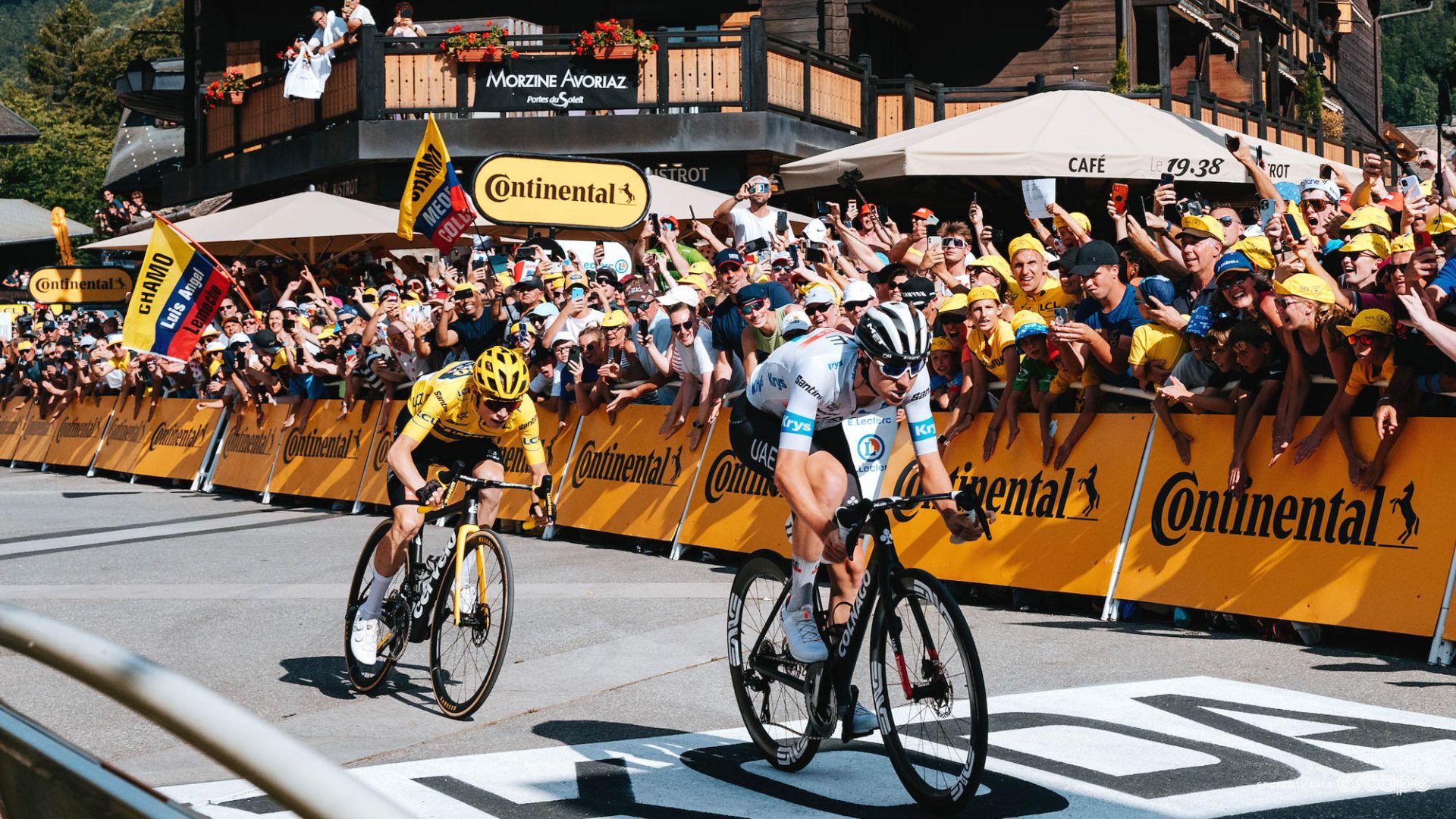Fifty meters past the finish line in Morzine, Tadej Pogačar and Jonas Vingegaard roll to a stop an arm’s length from each other, facing in opposite directions, eager hands grabbing at bottles of water, dousing themselves, their helmets, their backs. Pogačar’s lips are crusted, Vingegaard’s slightly less so. Gendarmes with thick arms hold back duelling scrums, allowing them to breathe. Neither looks at the other. They are wound tight.
We stand, wide-eyed, on the entrance of the final week of the Tour de France wondering what, if anything, can finally pull these two apart. The gap is ten seconds now. It was nine yesterday. They will not be separated. Not by heat, not by gravity or by ripping, dangerous descents. Their teams are strong, matched up well. Today, five categorized climbs – the last up the fearsome Joux Plane – could only separate them for a minute, until Vingegaard welded the race back together. One second was gained after four hours, and only because of time bonuses.
Neither can get rid of the other, which means we’re in for quite a show.
Setting the context: The gap is 10 seconds after 14 stages. Three mountain days and a time trial remain. The gap between the two roughly halved in most of the difficult stages since last Saturday, the day Vingegaard took just over a minute on Pogačar on the way into Laruns. Pogačar took twenty-eight seconds into Cauterets on stage 6; eight seconds up to Puy de Dôme on stage 9; eight more on Friday to Grand Colombier. One second went the other direction on Saturday, though who knows what might have been without some poorly placed motorcycles.
Pogačar’s tactic is clear. He’s happy to win this Tour de France by seconds. He trusts his sprint and the time bonuses work in his favor (he’s taken all reasonably available to him, except the Joux Plane), he knows he can open small gaps in hard finales, and he’s counting on staying close in the time trial. There’s half a minute available to him over the next week simply by dropping Vingegaard in the final 500 meters.
Vingegaard’s tactic is also clear, albeit potentially more risky and indeed more difficult to pull off. Jumbo-Visma believes he has an advantage on long, hot, hard days. That’s why they put the pressure on so early on Saturday; to isolate Pogačar and crack him like they have twice before. “Now it is about seconds, but also possible it can go with minutes,” Jumbo sport director Frans Maassen told Escape Collective after the finish. “Of course, you keep [the bonuses] in mind, but it’s not the most important thing. We wanted to try to hit Pogačar but yeah, he did also hit us. I think in the end it was 1-1.”
In other words, if Pogačar just keeps doing what he’s doing, he’s likely to pull out a small lead in the coming days. Vingegaard can play defense, but for him to pull further ahead, he needs a much more dramatic falter from his rival. He thinks such drama is likely. “I still don’t think it will be decided on seconds,” he said. “I still think that, at one point, one of us will take a bit of time on the other one.”
When a Tour is this tight, the stress is palpable. It’s the uncertainty that gets them. When Vingegaard rolled back toward the podium area, tired and hot and in need of an ice bath, he waved angrily at two cameramen. “Out of the way,” he said, a sharpness to his voice, the first time I’ve heard it with an edge.
And then there’s Pogačar. The white crusted lips are concerning. His anger at losing a bottle near the top of Joux Plane hints at what’s simmering beneath the surface.
They are both under enormous weight, unable to see a clear path forward; hoping, most of all, that when somebody finally cracks, it won’t be them.
We go again tomorrow.
What did you think of this story?

